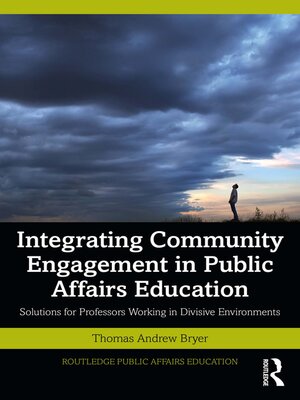Integrating Community Engagement in Public Affairs Education
ebook ∣ Solutions for Professors Working in Divisive Environments · Routledge Public Affairs Education
By Thomas Andrew Bryer

Sign up to save your library
With an OverDrive account, you can save your favorite libraries for at-a-glance information about availability. Find out more about OverDrive accounts.
Find this title in Libby, the library reading app by OverDrive.



Search for a digital library with this title
Title found at these libraries:
| Library Name | Distance |
|---|---|
| Loading... |
Community engaged universities prepare students to participate in societies in ways that are inclusive. This book presents a coherent argument for higher education institutions not only to encourage students to engage in their communities, but also to develop themselves as community engaged institutions. Analyzing the design and implementation of community engaged teaching and learning practices, author Thomas Bryer explores training in democratic practices and envisions a future in which higher education institutions are better prepared to cope with democratic backsliding.
Teaching and professional development cases are woven throughout—developed, adapted, and enhanced by the author over a period of years—and grounded in the great debates happening today. Integrating Community Engagement in Public Affairs Education is a culmination of multiple years of experimentation with different approaches to teaching future and practicing public sector leaders the tools of democratic engagement. The text is grounded in a case‑based design that spans undergraduate, Master's, and Ph.D. students, as well as local government managers, offering concrete examples of teaching and learning strategies that promote public value and measurable social impact. The book closes with practical strategies for publicly engaged scholars to effectively educate the next generation of students about democratic engagement within divided communities. It will be required reading for public administration faculty, as well as practicing public administrators and those who provide training to them.







